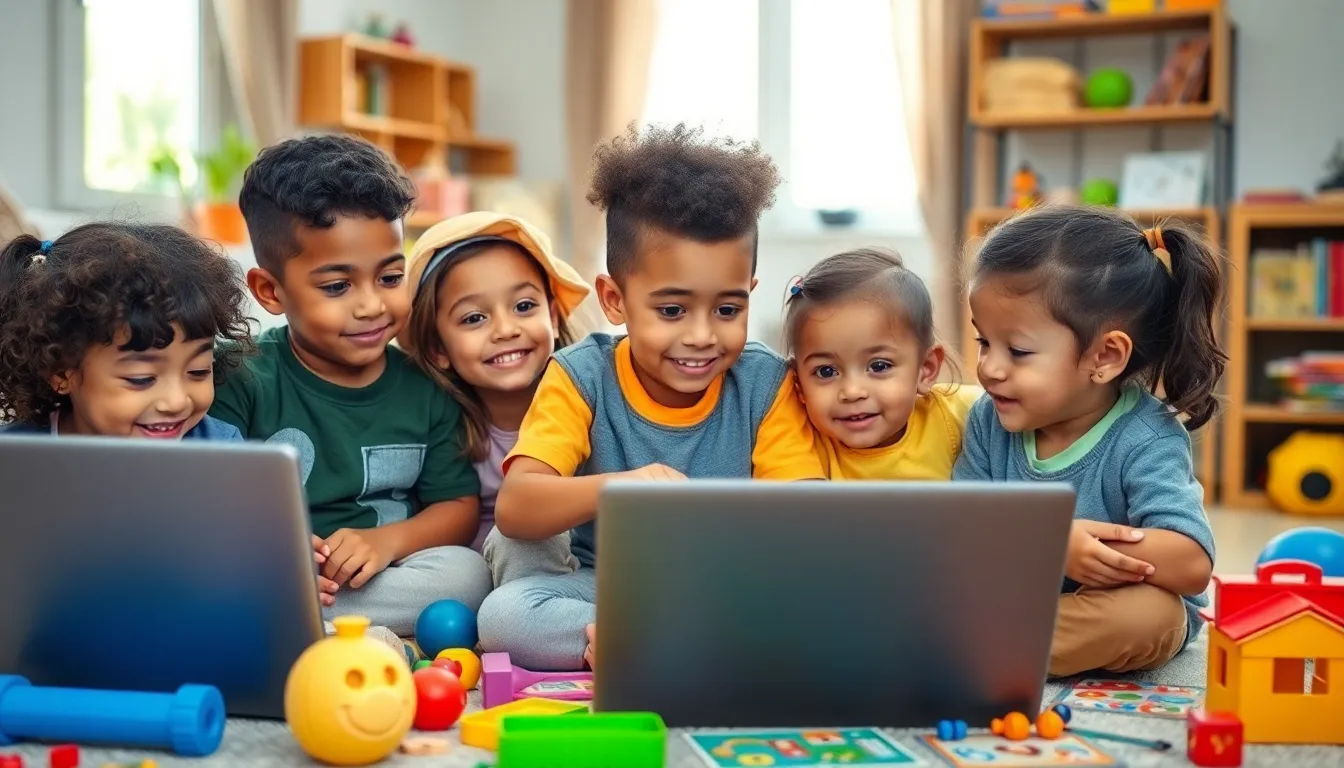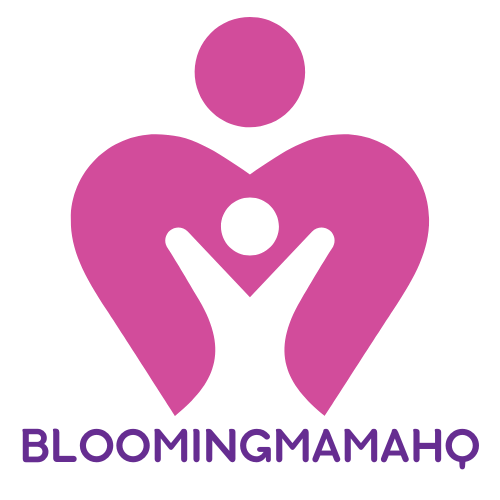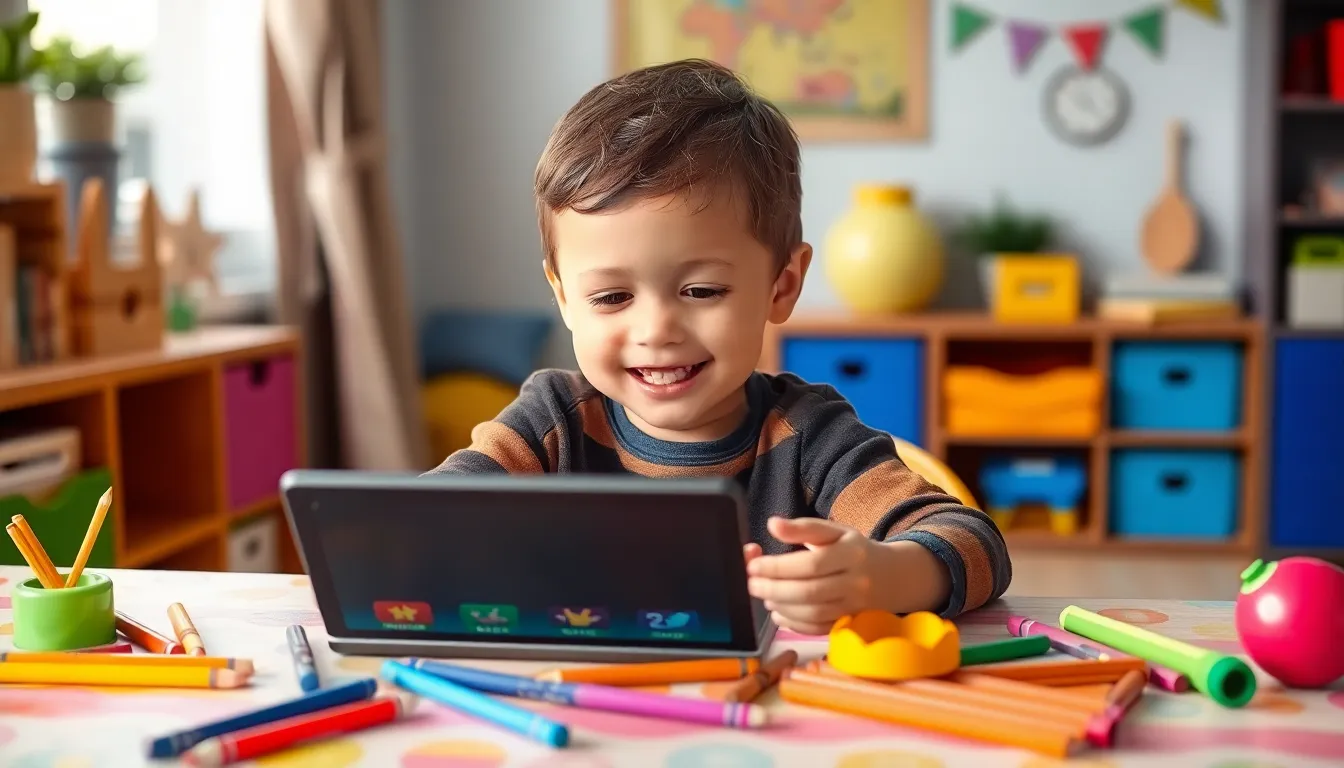In a world where even toddlers can master the art of swiping, preschool online learning is becoming the new playground. Gone are the days of crayons and finger paints—now, little ones can explore a universe of knowledge from the comfort of their living rooms. Imagine your child giggling while learning the ABCs through interactive games, all while you sip your coffee in peace. Sounds like a win-win, right?
Table of Contents
ToggleOverview of Preschool Online Learning
Preschool online learning offers young children engaging ways to acquire essential skills through technology. It simplifies the educational process for parents, providing opportunities for little ones to learn from the comfort of home.
Definition and Importance
Preschool online learning refers to virtual education systems designed for children aged three to five. These programs promote foundational skills like literacy and numeracy through interactive activities. Engaging content fosters curiosity, making learning enjoyable. Furthermore, online platforms often incorporate multimedia elements, ensuring varied learning styles are addressed. They also allow for flexible schedules, accommodating the busy lifestyles of families. Parents can monitor progress, ensuring their child is developing skills crucial for future education. As access to technology improves, this mode of learning gains importance in early childhood development.
Growth of Online Learning Platforms
A surge in online learning platforms has transformed early childhood education. Numerous programs have emerged, offering diverse curricula tailored to preschool-age children. Statistics indicate a dramatic increase in enrollment in online preschool programs, particularly since 2020. Parents often cite convenience and accessibility as key factors driving this growth. Many platforms now feature live interaction with educators, which enhances the learning experience. An increasing number of apps and games also provide supplemental learning tools, ensuring children remain engaged outside traditional settings. The ongoing evolution in technology further supports the expansion of these educational avenues.
Benefits of Preschool Online Learning

Preschool online learning offers several notable advantages for early childhood education. These benefits enhance the educational experience for young children and provide convenience for parents.
Flexibility and Accessibility
Flexibility stands out as a primary benefit of preschool online learning. Parents can schedule learning sessions around their routines, allowing for a personalized approach to education. Accessibility remains crucial, with programs available from anywhere with an internet connection. Young learners can participate in interactive lessons from home, reducing commute time for families. Convenience plays a significant role in helping parents balance work and childcare. Programs often provide on-demand content, which allows children to learn at their own pace.
Enhanced Learning Resources
Enhanced learning resources contribute significantly to the effectiveness of preschool online learning. Interactive platforms utilize videos, games, and quizzes to engage young children. Varied materials cater to different learning styles, ensuring that all children grasp new concepts in ways that resonate with them. Access to diverse educational tools can enrich the learning experience. Many online programs feature live interaction with qualified educators, which encourages participation and nurtures social skills. Overall, these resources foster an engaging environment that promotes curiosity and enthusiasm for learning.
Challenges in Preschool Online Learning
Preschool online learning presents several challenges that can affect young learners and their families.
Digital Divide Issues
Digital divide issues significantly impact accessibility to online learning. Families with limited internet access experience difficulties participating in digital education. Children from lower-income backgrounds often lack necessary devices such as tablets or laptops. Studies show that about 15% of US households with children don’t have internet access, which hampers their ability to engage with preschool programs. This gap can lead to inequalities in educational opportunities. Those without resources may struggle to keep up with peers who benefit from robust online learning environments. Addressing these digital divide issues remains crucial for equitable preschool education.
Engagement and Attention Span
Engagement and attention span challenges affect preschoolers in online learning scenarios. Young children typically need hands-on experiences to maintain their focus. Virtual environments may not always provide the sensory interactions they crave, leading to disengagement. Research indicates that children aged three to five often have attention spans of only 8 to 12 minutes, highlighting the need for frequent breaks and engaging content. Moreover, distractions at home can divert attention from learning activities. Strategies such as interactive games and short lesson segments can help sustain interest and foster participation in online settings.
Best Practices for Parents and Educators
Maintaining effective online learning for preschoolers requires intentional strategies. Parents and educators create supportive environments that enhance engagement and learning.
Creating a Structured Learning Environment
Establishing a consistent routine helps young learners thrive in online settings. Scheduling specific times for lessons fosters familiarity and expectation, which benefits focus. Designating a quiet and organized learning space reduces distractions and sets the stage for effective learning. Colorful decorations or learning posters can support visual engagement. Clear expectations for participation encourage active involvement from children. Frequent check-ins with the child during lessons ensure they understand the material and remain engaged.
Incorporating Interactive Activities
Including interactive activities is crucial for captivating preschoolers’ attention. Engaging games and hands-on projects stimulate curiosity and creativity. Live discussions with educators provide opportunities for social interaction and learning reinforcement. Using educational apps that promote active participation encourages children to explore concepts. Frequent use of videos and songs enhances vocabulary development and retention. Activities such as simple experiments or art projects allow children to connect learning with real-world experiences. Incorporating storytelling sessions also fosters imagination and language skills.
Future of Preschool Online Learning
The landscape of preschool online learning continues to evolve rapidly. Innovative technologies and new pedagogical approaches transform how young children engage with education.
Trends and Innovations
Emerging trends shape preschool online learning experiences. Virtual reality (VR) platforms enable immersive learning environments that captivate children’s imaginations. Gamification elements increase motivation, encouraging active participation through rewarding educational games. Personalization technologies adapt lessons to individual learning styles, enhancing effectiveness. Additionally, the integration of artificial intelligence (AI) facilitates real-time feedback, enabling educators to tailor instruction to each child’s needs. Growth in mobile app usage supports learning on-the-go, allowing flexibility in children’s learning schedules. These innovations collectively contribute to more engaging and effective educational experiences.
Potential Impact on Early Childhood Education
The potential impacts of online preschool learning are significant. Improved accessibility allows children from diverse backgrounds to access quality educational resources, narrowing educational gaps. Enhanced engagement through interactive lessons fosters a love for learning early on, leading to lifelong educational pursuits. Moreover, increased parental involvement promotes stronger family bonds, as parents can actively participate in their child’s learning journey. With the right support, online platforms can aid in developing essential skills like socialization and emotional intelligence, achieving holistic growth for young learners. This shift toward online learning carries lasting implications for the future of early childhood education.
The rise of preschool online learning marks a significant shift in early childhood education. It offers a flexible and engaging alternative for young learners while accommodating the busy schedules of parents. With interactive activities and live educator support, children can thrive in a nurturing virtual environment.
While challenges exist, such as digital access disparities and maintaining engagement, innovative strategies can enhance the online experience. As technology continues to evolve, the potential for personalized learning grows, making education more accessible and tailored to individual needs.
This transformation not only fosters a love for learning but also strengthens family connections, paving the way for a brighter future in early education.



